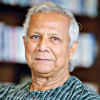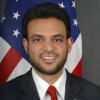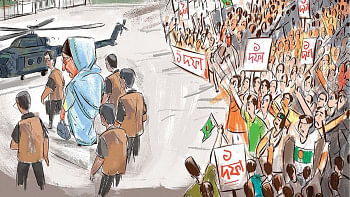India’s ‘concern’ over Bangladesh’s internal affairs and beyond

Imagine if Bangladesh's Ministry of Foreign Affairs had issued a note of concern regarding an incident in India's Uttar Pradesh last month, where at least four minority Muslims were gunned down allegedly by police during violence linked to a court-ordered survey of a centuries-old mosque. Some Hindu groups claim the mosque was built on the site of a destroyed temple. New Delhi would likely have reacted with the strongest possible language, accusing Dhaka of interfering in its internal affairs.
No, Bangladesh did not express its reaction at the disturbing incident that took place in its neighbouring country, ostensibly considering its internal affairs. Moreover, in the last 10 years, numerous incidents involving religious minorities, ranging from repression to killings, have occurred in India, with Bangladesh showing no diplomatic concern, perhaps.
Last month, India responded to the arrest of Hindu monk Chinmoy Krishna Das Brahmachari in Bangladesh by expressing "deep concern," claiming it was part of a broader pattern of attacks on Hindus and other minorities in the country. Bangladesh, however, was forced to respond to India's statement with utter dismay, stating that it was its internal affair.
India's Ministry of External Affairs statement on Chinmoy Das rather displays a pattern that the Indian administration has adopted since the fall of Sheikh Hasina's autocratic regime on August 5, 2024 through a student-led mass uprising. Hasina, considered an all-weather ally of the Indian administration, was replaced in the aftermath of this upheaval following more than 15 years of rule, during which she dismantled Bangladesh's electoral system, allowed enforced disappearances—an act unimaginable in the democratic world—using security forces, and facilitated the laundering of money from banks through her cronies. Notably, after her regime collapsed like a house of cards, Hasina sought refuge in India, to which New Delhi agreed and she has been staying there since.
Not only has India's Ministry of External Affairs raised such concerns, but Prime Minister Narendra Modi himself has seized the opportunity to express so-called sympathy for Hindus in Bangladesh.
For instance, in late August, Modi tweeted about a conversation with US President Joe Biden, stating that they discussed Ukraine and "also talked about the situation in Bangladesh, emphasising the need for early restoration of normalcy and ensuring the safety and security of minorities, especially Hindus, in Bangladesh." However, the White House's readout of the same conversation made no mention of Bangladesh.
Yes, minorities—whether based on religion, language or ethnicity—remain under pressure to varying degrees around the world. This is not just a problem in Bangladesh and India. Has India's ruling party, the Bharatiya Janata Party (BJP), not been criticised for spreading its Hindu agenda since 2014, when it swept to power? Has Prime Minister Modi not been criticised for making Islamophobic remarks in 110 election campaign speeches?
It is the responsibility of the majority to protect the minority. When it comes to protecting and caring for religious minorities, both Bangladesh and India—which share a 4,096 km border—should work together rather than engage in unnecessary bickering in public, especially since many people in both the countries have family ties across the border.
It is understood that public statements and rhetoric favouring majorities while undermining minorities are often made by ultranationalist politicians in every country to woo populist votes.
Regarding rights issues, while human rights are primarily a country's internal matter, they are also a concern for the international community, particularly in countries that have adopted or are in the process of adopting democratic systems.
Countries that sign international human rights treaties are bound to uphold, safeguard, and ensure the fulfilment of human rights. They are responsible for protecting individuals and groups from violations and for taking measures to prevent and address such abuses. If national legal systems fail to resolve these issues, individuals have the option to seek recourse through regional or international mechanisms.
Every country is under watch. Human Rights Watch in its 2024 report says, "The Indian government undermined its aspirations for global leadership as a rights-respecting democracy during 2023 with its persistent policies and practices that discriminate and stigmatise religious and other minorities."
Establishing a deeply rooted democracy can significantly help combat practices that stigmatise religious and other minorities. However, in recent years, the quality of Indian democracy has dwindled. US-based non-profit Freedom House downgraded India's status from a free democracy to a "partially free democracy" in 2021, while the Sweden-based V-Dem Institute classified India as an "electoral autocracy." The Economist Intelligence Unit ranked India 53rd in its 2020 Democracy Index, which made it a "flawed democracy," citing factors such as the Citizenship Amendment Act (CAA), National Register of Citizens (NRC), and the revocation of special status in Indian-administered Kashmir. The EIU's 2023 Democracy Index put India in the 41st position, putting it in the flawed democracy category.
For Bangladesh, when it comes to restoring democracy, a golden prospect beckons in the aftermath of Sheikh Hasina's fall. The Hasina regime gradually ruined democracy through deeply flawed national elections in 2014, 2018, and 2024.
India itself is beset with numerous challenges related to democracy, human rights, and overall good governance. Therefore, it could work jointly with its neighbours to address these issues. In this context, reviving SAARC could serve as an effective launching pad, fostering cooperation and eradicating hostility in the region. Divisive and discriminatory Citizenship Amendment Act (CAA) and National Register of Citizens (NRC) are not going to help India either.
Can the European Union—a union of 27 nations that has accomplished political and economic integration through a shared currency and a cohesive foreign and security policy—act as a model for South Asia in fostering peace and democracy?
For a lasting relationship with Bangladesh, India must build a friendship based on equality and mutual respect—the policy that Dhaka has repeatedly sought after Prof Muhammad Yunus, a Nobel peace laureate, took over as the chief adviser of the interim government.
After being summoned by the Bangladeshi authorities following a security breach by zealots at the Agartala mission, Indian High Commissioner in Dhaka Pranay Verma told journalists that the wide-ranging and multifaceted Indo-Bangla relationship cannot be stuck on one issue.
It is time now for Dhaka to adopt a wait-and-see approach, as Verma stated, "We are ready to engage with Bangladesh's interim government and are committed to working together."
Shamim A. Zahedy is a journalist. He can be reached at [email protected].
Views expressed in this article are the author's own.
We welcome your contributions and analysis of global events, and responses to our articles. To submit articles to Geopolitical Insights, please send an email to [email protected].
Follow The Daily Star Opinion on Facebook for the latest opinions, commentaries and analyses by experts and professionals. To contribute your article or letter to The Daily Star Opinion, see our guidelines for submission.

 For all latest news, follow The Daily Star's Google News channel.
For all latest news, follow The Daily Star's Google News channel. 








Comments